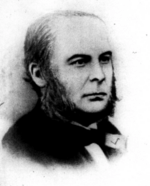Charles Wycliffe Goodwin facts for kids
Quick facts for kids
Charles Wycliffe Goodwin
Egyptologist, Bible Scholar and Judge
|
|
|---|---|
 |
|
| Assistant Judge, British Supreme Court for China | |
| In office 1865–1878 |
|
| Preceded by | New position |
| Succeeded by | Robert Mowat |
| Personal details | |
| Born | 2 April 1817 King's Lynn, Norfolk |
| Died | 17 January 1878 (aged 60) Shanghai International Settlement |
Charles Wycliffe Goodwin (1817–1878) was an English expert on ancient Egypt, a bible scholar, a lawyer, and a judge. He was known for his deep knowledge of ancient texts. His last job as a judge was as the Acting Chief Judge of the British Supreme Court for China and Japan.
Contents
Goodwin's Early Life
Charles Wycliffe Goodwin was born on April 2, 1817, in King's Lynn, Norfolk, England. He studied at St Catharine's College, Cambridge. He finished his studies in 1838. After college, he became a fellow of St Catharine's College. In 1843, he became a lawyer at Lincoln's Inn. He stopped being a fellow of St Catharine's in 1847.
Goodwin's Academic Interests
Goodwin was a very smart person with many interests. He is known for publishing the first papyrus text. A papyrus is an ancient paper made from a plant. He published this text for the Cambridge Antiquarian Society in 1853. It was one of the Papyri Graecae Magicae V, which are ancient magical texts. He translated it into English and added his notes.
In 1860, he wrote an article for a famous book called Essays and Reviews. He was the only non-religious person to write for this book. Other writers were important religious scholars.
Goodwin was an expert in many areas. He was a top Greek scholar and knew a lot about Hebrew. He also understood Anglo-Saxon, which is an old form of English. He even published new texts in Anglo-Saxon. He also knew a lot about nature, especially rocks and the Earth (geology).
When he lived in London, he wrote about music and art. He was also the editor of a newspaper called Literary Gazette for a while. Because he was so good at Greek and Hebrew, people often asked him for help when they were revising the New Testament part of the Bible.
But his main interest was always in ancient Egypt. He started learning about it when he was still in school. He loved to understand ancient Egyptian and Coptic texts. He was especially interested in texts written in a special cursive script called hieratic.
Goodwin spent a lot of time at the British Museum in London. He copied many papyrus texts there. He worked closely with Samuel Birch, who was in charge of the Oriental Department. He also often shared information with other leading Egyptologists of his time.
Goodwin's Role as a Judge
In 1865, Goodwin was chosen to be an Assistant Judge for the British Supreme Court for China and Japan. This court was new at the time. Sir Edmund Hornby was the first Chief Judge.
This court had power over British citizens in China and Japan. This was because of special agreements called extraterritorial rights. These agreements meant that British people in China and Japan followed British laws, not local laws. The court also heard appeals from other British courts in China and Japan.
Goodwin worked as an assistant judge to Sir Edmund Hornby. He was based in Shanghai until 1874. Then he moved to Yokohama, Japan, and stayed there until early 1877. After that, he returned to Shanghai. In 1876, Goodwin became the Acting Chief Judge after Edmund Hornby retired.
Goodwin's Death and Legacy
Goodwin passed away in Shanghai on January 17, 1878. He was buried in the Shanghai Cemetery. This cemetery is now called Huaihai Park.
A special statue, a bust of Goodwin, was placed at the Cairo Museum. It is part of a memorial for another famous Egyptologist, Auguste-Edouard Mariette.
Goodwin's Published Works
- Ed. and tr. The Anglo-Saxon Version of the Life of St. Guthlac, Hermit of Crowland. London, 1848. This is an old English version of a Latin story about St Guthlac.
- Ed. and tr. Anglo-Saxon Legends of St Andrew and St Veronica. Cambridge Antiquarian Society. Cambridge, 1851. These are old English stories about St Andrew and St Veronica.
- Translation of a Fabulous Tale from an Egyptian Papyrus in the British Library
- On Four Songs contained in an Egyptian Papyrus in the British Library
- On Some Japanese Legends
Legal Books
- The Practice of Probate and Administration
- The Succession Duty Act
 | Sharif Bey |
 | Hale Woodruff |
 | Richmond Barthé |
 | Purvis Young |

